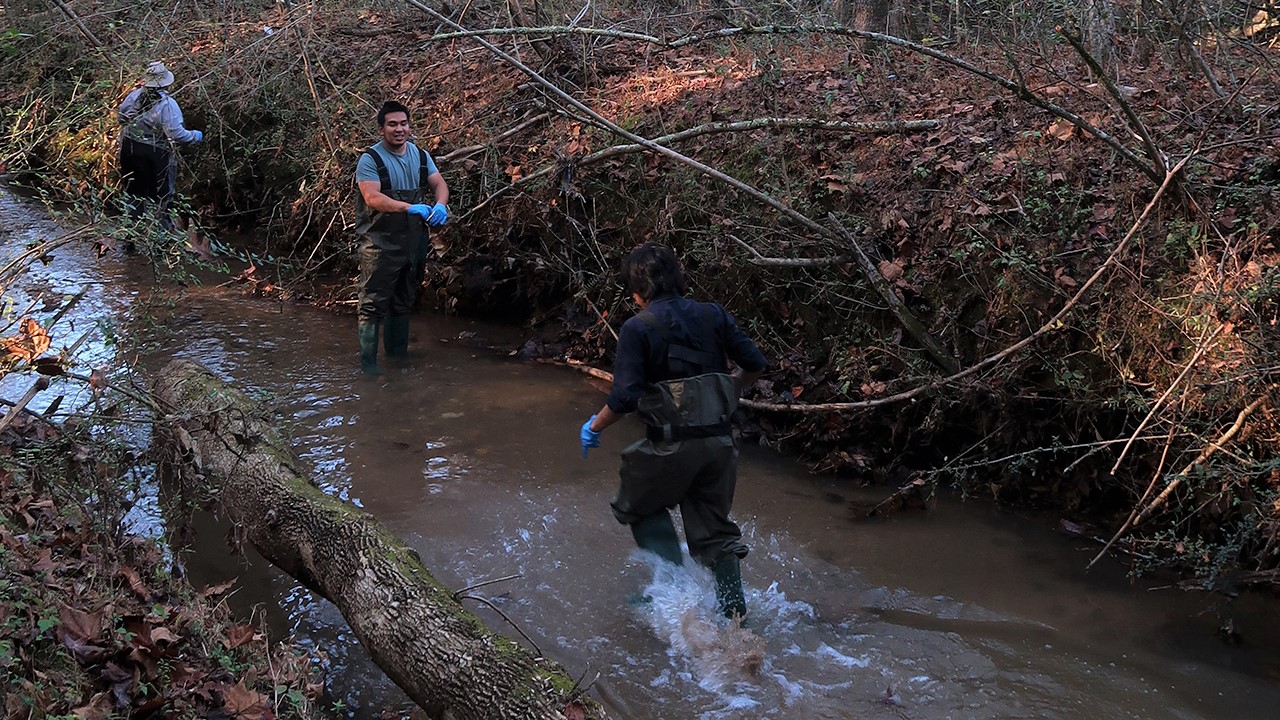Ecological Protection Lab and community partners saving hemlocks

Article By: Staff
Every time University of North Georgia (UNG) senior Hannah Carroll sees an Eastern hemlock, she makes a beeline for the tree to search for signs of the hemlock wooly adelgid (HWA). The piercing, sap-sucking insect is an invasive species that is slowly but surely killing the hemlock trees of north Georgia.
"Our Eastern hemlock has no natural defenses against the wooly adelgid," said Stacie James, program coordinator of the Environmental Leadership Center at UNG since 2017. "But the beetle is the natural predator of the wooly adelgid."
Therefore, James and her students are working diligently to control the HWA by rearing and releasing of predatory beetles in the Ecological Protection Lab, formerly called the Beetle Lab, on UNG’s Dahlonega Campus. James explained she and her students raise beetles inside the lab, then acclimate them to nature. Later, the beetles are released into sites across north Georgia to help stave off the HWAs.
"Tree mortality is five to seven years once infected," James said. "So we have to be proactive."
Since the Ecological Protection Lab opened Feb. 23, 2008, its efforts are working. James explained the data she and her students have collected from previous release sites prove that.
"The Sasajiscymnus tsugae beetle was recovered at Boggs Creek about 10 years after release. Within that release site, the hemlocks demonstrated a remarkable increase in tree health," James said. "This has been the trend across north Georgia as we perform recovery research and tree health assessments throughout the many Hemlock Conservation Areas where beetle releases occur."
The lab is not alone in its mission to battle the HWA. Lumpkin Coalition, Save Georgia Hemlocks, U.S. Forest Service, and Georgia Forestry Commission are community partners.
A charitable nonprofit, Lumpkin Coalition is a diverse group of community volunteers who are committed to preserving and enhancing the quality of life in north Georgia, according to its website. Its fundraisers such as the Hemlock Festival help support the Ecological Protection Lab, which is in the building across the street from Health and Natural Sciences on Sunset Drive in Dahlonega.
"The Lumpkin Coalition plays such a crucial role for us," James said. "Its donations buy our beetles for the lab every year. And its donations pay for my student workers."
The five students — Amanda Sirianni, Alexandra Herndon, Emily Williamson, Arianna Disser, and Carroll — are all grateful for the lab experience.
 |
|
Every time University of North Georgia (UNG) senior Hannah Carroll sees an Eastern hemlock, she makes a beeline for the tree to search for signs of the hemlock wooly adelgid (HWA). The piercing, sap-sucking insect is an invasive species that is slowly but surely killing the hemlock trees of north Georgia. |
Herndon, a senior from Flowery Branch, Georgia, majoring in biology, wants to work in wildlife conservation. The hands-on field work gives her real-world experience that other college students may not have. Carroll agreed, explaining of the three Georgia schools raising beetles to preserve hemlock trees, UNG is the only school conducting field recovery research.
"There is no opportunity like this at other schools in Georgia," said the biological science major from Forsyth County, Georgia. Carroll started college at UNG then transferred to another school before returning to the Dahlonega Campus. "For me, I wish I would have stayed here."
James said recovery research is when students venture into the field to collect the beetles, identify the species that have established in a specific zone and determine if they are thriving.
All of the students said field work is their favorite, but they also take pride in sharing their knowledge. James and the students make presentations to area schoolchildren about UNG’s efforts to stop the spread of HWA and how the kids can help.
The Ecological Protection Lab workers also share their insights to the community at large at events, such as upcoming HemlockFest from Nov. 2-4 near Dahlonega. The three-day event is filled with music, camping and fun for all ages with proceeds funding efforts to save north Georgia’s Hemlock trees and restore American chestnut trees, the HemlockFest website said.
James said she want visitors to the lab's booth at HemlockFest to take away three things.
"First, there is hope for the Hemlock," she said. "Second, everybody has a part to play in saving the hemlock. Third, our biological controls are effective and we can continually improve them."
For more information about the Ecological Protect lab, visit its website.



